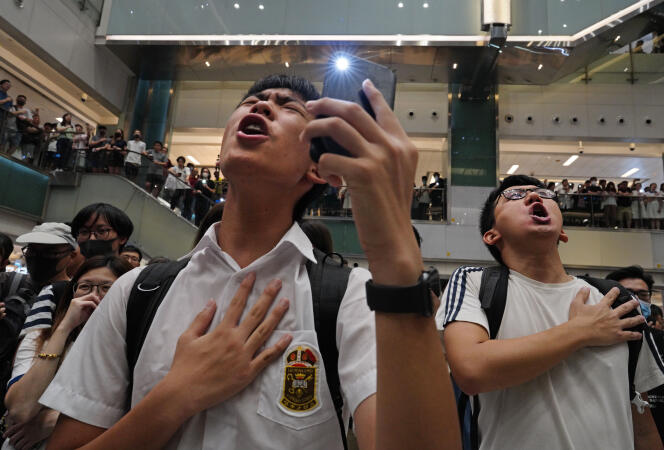


No longer will the tune of "Glory to Hong Kong" be heard: not in city streets, not in shopping malls, not on school playgrounds where it was already banned by the Ministry of Education, and especially not in stadiums, in Hong Kong or anywhere else in the world, where it was often played by mistake during international competitions, when Hong Kong athletes took to the field, or during medal ceremonies, in place of "March of the Volunteers," the Chinese national anthem.
It was very likely these public and international incidents would strike a chord with the Hong Kong authorities, who feared, more than anything, offending Beijing. According to a police estimate quoted during the trial, there have been 887 instances in recent years where "Glory to Hong Kong" has been played instead of "March of the Volunteers."
In June 2023, following a series of embarrassing blunders, the government took the song to court. In its application for an injunction, it noted that the song "has been used to incite others to participate in acts and activities which are very likely to constitute offenses such as secession and sedition, thereby endangering national security. The song has also been mistakenly presented as the 'national anthem of Hong Kong' (instead of the correct one 'March of the Volunteers'). This has not only insulted the national anthem but also caused serious harm to the state and the HKSAR [Hong Kong Special Administrative Region]."
The government therefore decided, "after careful consideration," to ask the Court to prohibit any person from "broadcasting, performing, printing, publishing, selling, offering for sale, distributing, disseminating, displaying or reproducing in any way including on the internet and/or any media accessible online and/or any internet-based platform or medium, the song, whether its melody or lyrics or in combination."
In the first case, in July 2023, a court ruled that banning the song was incompatible with the guarantee of freedoms, in particular freedom of expression. In its appeal, the government added that even freedom of expression has its limits. The 61-page ruling, handed down on Wednesday, ultimately ruled in favor of the government. The composer of the song "intended it to be a 'weapon' and so it had become," according to the ruling. "Academic and journalistic activities" are however excluded from this new injunction.
"Glory to Hong Kong" was released in August 2019, at the height of the anti-government protests that took place in the second half of the year. Elegant and powerful, with heroic swells and a harmonious melody, it instantly became the rallying cry of the demonstrators. Its composer, who remains anonymous behind a cryptic pseudonym, Thomas dgx yhl, indeed conceived their work to galvanize the crowds.
You have 33% of this article left to read. The rest is for subscribers only.
